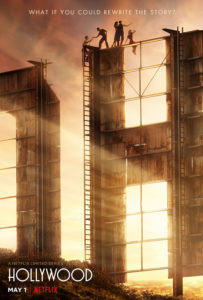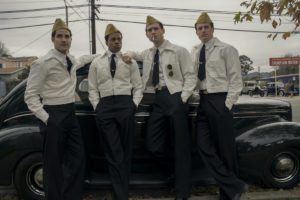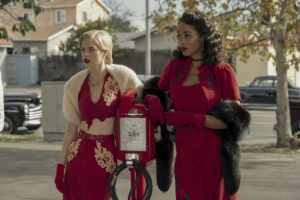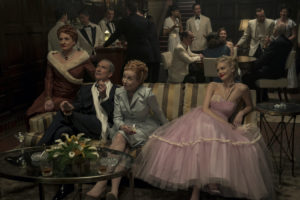Series Review: The Future Looks Bright in “Hollywood”
Written by: Christopher Llewellyn Reed | April 29th, 2020

Hollywood (Ian Brennan/Ryan Murphy, 2020) 3½ out of 4 stars.
It’s post-World War II in Los Angeles, and everyone wants to be a star. Not all will make it – in fact, all but a tiny fraction won’t – and those who do succeed will only do so by giving up body and soul, in equal measure. The studio system is at its peak power, not yet truly challenged by the aftermath of the 1948 Paramount antitrust case that would undo decades of distribution monopolies, nor by television, which at that point was but a novelty. No, the movies hold pride of place in American popular culture, and those lucky folks who find a way inside just might ascend up to the firmament of stars. If, that is, they are white and sexually straight, and while they can hide the latter, it’s difficult to mask the former. Still, everyone has fantasies, and since Hollywood is the realm of reverie, who knows what might happen. Hold on tight to those dreams, guy (or gal). It’s your turn to shine.
So begins the magnificent seven-part Netflix series Hollywood, brought to us by showrunners Ian Brennan and Ryan Murphy (two of the three creators of Fox Network’s Glee). Firmly grounded in real history, the show gets its facts about the time and place brilliantly correct – at least according to legend – before departing on a wild and, by the end, simultaneously glorious and melancholy ride along an alternative path this country might have taken had our cultural and social mores not been so anchored in a European heteronormative world view. Libidinous to the extreme, Hollywood is a period piece rife with sex of all kinds, using its prurient content as an entry point for serious discussions about race, gender and sexual orientation. It’s also damn fine filmmaking.

The young actors who make up the hopefuls are an exciting bunch, including David Corenswet (Netflix’s The Politician), Darren Criss (Glee), Laura Harrier (Blackkklansman), Jake Picking (Only the Brave), Jeremy Pope (The Ranger) and Samara Weaving (Guns Akimbo), all beautifully complemented by veterans like the great Patti LuPone, Broadway director Joe Mantello, Dylan McDermott (Blind), Jim Parsons (CBS’ The Big Bang Theory) and Holland Taylor (Kepler’s Dream). Back and forth, round and round they go in the whirlwind of momentous change that might have, could have, should have happened. Will it, here? For that answer, you must watch to the end.
It all starts at a gas station, which, if you saw the deliriously lecherous 2018 documentary Scotty and the Secret History of Hollywood, you know all about (and if you haven’t seen that film, make sure you do). There, naïve hopeful Jack (Corenswet) discovers that his physical charms are an asset not just to get in the soundstage door (something they are not, in fact, helping him to do … yet), but to earn a fast buck. Owner Ernie (McDermott)) knows a good-looking prospect when he sees one, and doesn’t let Jack’s married status get in the way. Yes, there’s prostitution in the air, but since producers and agents expect their wannabes to put out, perhaps it’s merely a training ground for that shot at the big time. Still, there’s only so much Jack is willing to do – and only certain people – so when Ernie also expects him to take on the male clientele, he recruits someone new: Archie, who prefers men. It’s all fun in the sun, and the money comes easy. Jack is white and straight, Archie black and gay, but they’re both playing the same game.

Meanwhile, Raymond (Criss), a promising director passing for white (he’s half Filipino) is about to helm his first picture. His girlfriend, Camille (Harrier), is an actress, auditioning for roles at the same studio, but there’s no chance he could cast her in anything more than a tiny, subservient part, since she’s black and relegated to playing maids. In fact, they have to keep their relationship a secret, lest it affect his career. Someone else has a secret, too: Roy Fitzgerald, aka Roy Scherer (Picking), whose manipulative agent, Henry Wilson (Parsons) renames Rock Hudson. The attractive, novice actor has very little talent, but lots of sexual appeal. Just because he’s gay, however, doesn’t mean he’s there to service all of Wilson’s needs. Then again, sometimes one does what one has to.
And so the stage is set for a sweeping saga of a fictional movie production, with studio heads swept up by the energy of the new crowd. Archie, it turns out, is not just a handsome gigolo, but also a talented screenwriter. Jack, though in need of training, could have something of the leading man in him. Does it help that one of his recurring gas-station clients, Avis (Lupone) is well-connected? It can’t hurt. Who will finish on top by the conclusion? Judging by each episode’s opening-credit sequence (minus the first, which starts without it), our collection of engaging protagonists might help each other to flourish, rather than compete. It’s just another manner in which the show points to a healthier model of behavior.

At times some of the scenes feel overly expositional, actors spouting lines that explain a little too clearly the message of the series. That imperfection only serves to highlight how wonderful the rest is, stunningly photographed and staged, throughout. By the time the final image of the movie within the movie fades down, we have become so thoroughly engaged that we wonder why there can’t be more. Still, since what happens onscreen never actually transpired, and as a nation we remain far from a utopian society that accepts people for who they are, the hopeful trajectory of the story is tinged with more than a little sadness. Would that it could have been this way. What a lovely, cinematic dream.

